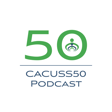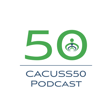
Orientation, Transition, and Retention: a CoP Spotlight
This episode our on-air host Dr. Stephanie Muehlethaler is joined by Cory Coletta, Josh Hass, and Lesley D'Souza as we explore the topic of Orientation, Transition, and Retention: a CoP Spotlight. We hope that you enjoy and choose to follow along as we release a number of episodes geared towards celebrating our past, present, and future as an organization.
About:
The CACUSS 50 Oral History Project is an initiative of the Canadian Association of College and University Student Services in recognition of our organization's 50 years of engaging student affairs professionals in Canada.
The series of podcasts is recorded and produced by: Sean Fast, Adam Kuhn, Nicholas Fast, Rachel Barreca, Stephanie Muehlethaler, Noah Arney, Sally Chen, Estefania Toledo, Paula Broderick, Jennifer Brown, Margaret de Leon, and Becca Gray. This podcast is recorded, produced, and published on the traditional territories of hundreds of Indigenous nations from across the northern half of Turtle Island, also known by its settler-colonial name, Canada. We are grateful for the opportunity to live, work, and learn on this land. For more information on the territories you may reside on, visit: https://native-land.ca/
Credits:
Music: Expanding the Limits | Performed by Audiorezout & Written by Oleksii Striapchyi | Stock Media provided by Audiorezout / Pond5
Podcast Cover Art by: Ravi Gabble (UTM)

